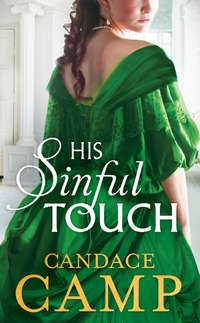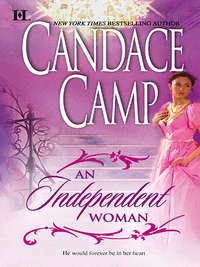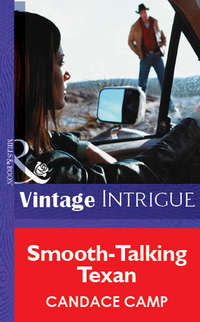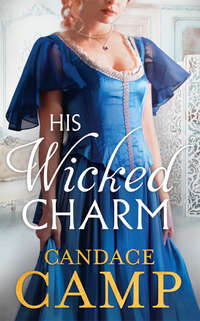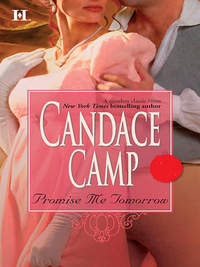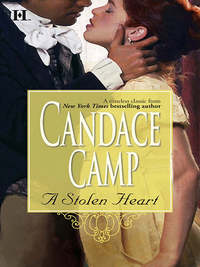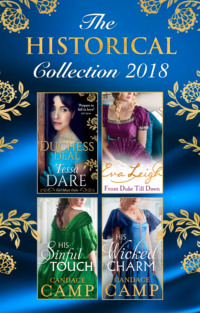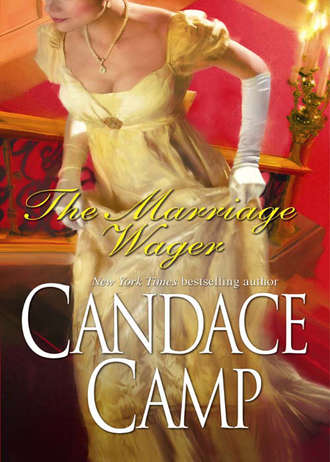
Полная версия
The Marriage Wager

CANDACE CAMP
THE Marriage WAGER

CONTENTS
CHAPTER ONE
CHAPTER TWO
CHAPTER THREE
CHAPTER FOUR
CHAPTER FIVE
CHAPTER SIX
CHAPTER SEVEN
CHAPTER EIGHT
CHAPTER NINE
CHAPTER TEN
CHAPTER ELEVEN
CHAPTER TWELVE
CHAPTER THIRTEEN
CHAPTER FOURTEEN
CHAPTER FIFTEEN
CHAPTER SIXTEEN
CHAPTER SEVENTEEN
EPILOGUE
CHAPTER ONE
LADY HAUGHSTON SURVEYED the throng of people below her, one hand resting lightly on the polished black walnut railing. She was aware that heads turned to look at her. Indeed, she would have been disappointed if they had not.
Francesca Haughston had been a reigning beauty of the Ton for over a decade now—at thirty-three, she no longer cared to be specific about the number of years since her coming out. She had been blessed with a naturally beautiful combination of features—light golden hair and large, deep blue eyes, skin that was as smooth and white as cream, a straight, slightly tip-tilted nose, and well-shaped lips that curled up a bit at the ends, giving her a faintly catlike smile. A small mole sat low on her cheek near her mouth, the tiny blemish only accentuating the near-perfection of her features. She was of medium height, with a lithe, slender form and an elegant carriage that made her appear taller than she actually was.
But even with the natural advantages Francesca had been given, she was always careful to show her looks to the best advantage. One would never find her dressed in anything less than the best, or with a pair of slippers on her feet that did not complement her dress or her hair arranged in a style that did not frame her face becomingly. While always in the forefront of fashion, she was not one to chase after foolish fads but chose only those shades that best suited her coloring and the styles that flattered her shape.
She was dressed tonight in her signature color of ice blue, the neckline of her satin dress low enough to show off her soft white shoulders and bosom in a way that was just a trifle dashing but not at all vulgar. Silver lace adorned the scoop neckline and ran around the hem of her gown, as well as cascading down the demi-train in back. A simple but striking diamond necklace encircled her slender white throat, a matching bracelet was on one arm, and more single diamonds winked here and there in the intricacies of her hair.
No one, she was certain, would have guessed that she hadn’t a feather to fly with. The truth was that her late, largely unlamented husband Lord Andrew Haughston, an inveterate gambler, had died leaving her with nothing but debts, a fact that she had been at great pains to conceal. No one was aware that the jewels adorning her were paste copies of the actual ones, which she had sold. Nor did even the most hawkeyed Society matron suspect that the kid slippers on her feet had been maintained with the utmost care so that they were now in their third season, or that the dress she wore had been cut from a different gown worn the year before and resewn by her talented maid into a newer style fresh off the most recent fashion doll from France.
One of the few who knew her true circumstances was the slender, elegant man beside her, Sir Lucien Talbot. He had joined the circle of her admirers during her first season, and though his romantic interest in Francesca was a pleasant fiction in which they both participated, his devotion to her was quite real, for over the course of the years, they had become fast friends.
Sir Lucien was both stylish and witty, facts that, given his perpetual bachelor status, made him a sought-after guest at parties. It was well-known that his pockets were frequently to let, as had always been the case with the Talbot family, but that did not mar his reputation as being “of very good Ton,” a quality that was held in far higher regard, at least by hostesses. He could always be counted upon to liven the conversation with an acerbic remark or two; he never created a scene; he was an excellent dancer and his stamp of approval could establish a party-giver’s reputation.
“Egad, what a crush,” he commented now, raising his quizzing glass to inspect the crowd below them.
“I believe Lady Welcombe adheres to the notion that a rout must have as many attendees as one has floor space,” Francesca agreed lightly. She opened her fan and waved it languidly. “I dread going down there. I know I shall get my toes trampled upon.”
“Ah, but is that not the point of a rout?” A deep voice came from slightly behind her and to her right.
Francesca knew that voice. “Rochford,” she said before she turned her head. “I am surprised to find you here.”
Both Lucien and Francesca turned to face the new arrival, and he sketched a bow to them, replying, “Indeed? I would think that you could reasonably expect to find almost everyone you know here.”
His mouth tightened in that familiar way that was almost, but not quite, a smile. His name was Sinclair, the fifth Duke of Rochford, and if Lucien’s presence was sought after by a hostess, the attendance of Rochford was the star in her crown.
Tall, lean and broad-shouldered, Rochford was dressed in the impeccable black-and-white of formal wear. A discreet ruby nestled in the folds of his snowy cravat and was echoed in the cuff links at his wrists. He was easily the most powerful and aristocratic man in the room at any gathering, and if there were those who did not care for his dark, saturnine good looks, they were rarely heard to say so. His manner, like his dress, was elegant without a hint of showiness, and he was as much admired by men for his excellent horsemanship or his dead aim as he was pursued by women for his fortune, high cheekbones and thickly lashed, Gypsy-dark eyes. He was approaching forty and had never married, and as a consequence he had become the despair of all but the most determined ladies of the Ton.
Francesca could not keep from smiling a little at his retort. “Indeed, you are probably correct.”
“You are a vision, as always, Lady Haughston,” Rochford told her.
“A vision?” Francesca arched one delicately curved eyebrow. “I notice you do not say a vision of what. One could suppose almost anything to end that sentence.”
Something glinted in his eyes, but he said in a neutral tone, “No one with eyes to see could suppose that aught but beauty would apply to you.”
“An excellent recovery,” Francesca told him.
Sir Lucien leaned in toward Francesca, saying in a low voice, “Don’t look. Lady Cuttersleigh is approaching.”
But his warning was too late, for a high-pitched woman’s voice cut sharply through the air. “Your Grace! What a delight it is to see you.”
A tall, almost skeletally thin woman made her way toward them, her short, rotund husband chugging along in her wake. The daughter of an earl, Lady Cuttersleigh had married a mere baron and was never averse to reminding him and the rest of the world that she had married beneath her. She considered it her duty to marry off her gaggle of daughters to someone worthy of intermingling with her own elevated bloodline. However, given the fact that her daughters strongly resembled her in both face and form, as well as overweening pride, she had found it a difficult proposition. She was one of the stubborn few who had not given up on snaring the Duke of Rochford for one of her girls.
A pained expression touched Rochford’s face briefly before he turned and executed a perfect bow toward the approaching couple. “My lady. Cuttersleigh.”
“Lady Haughston.” Lady Cuttersleigh acknowledged Francesca and gave a brief, uninterested nod toward Sir Lucien, whose title fell far below her expectations, before she turned back to Rochford, smiling. “Delightful party, is it not? The party of the Season, I vow.”
Rochford said nothing, only giving her a quizzical smile.
“I wonder how many ‘parties of the Season’ there will be this year,” Sir Lucien commented drily.
Lady Cuttersleigh favored him with a look of dislike. “There can be only one,” she told him repressively.
“Oh, I should think there will be at least three,” Francesca put in. “There is the one with the greatest attendance, which I think this one will surely win. But then there is the party of the year based on how lavishly it is decorated.”
“And the one based on who attends,” Sir Lucien added.
“Well, I know that my Amanda will be sorry that she missed this one,” Lady Cuttersleigh said.
Francesca and Lucien exchanged a glance, and Francesca unfurled her fan and raised it to her face to hide her smile. Whatever the subject, Lady Cuttersleigh could be relied upon to somehow bring her daughters into the conversation.
Lady Cuttersleigh went on to describe in detail the fever that had laid low two of her daughters and the touching way her eldest, Amanda, had stayed home to watch over them. Francesca could not help but consider what it said about the woman’s own maternal instincts that it had been her daughter who had felt the responsibility to remain with the sick girls.
She continued to babble about the virtues of Amanda until at last Rochford cut in to say, “Yes, my lady, it is clear that your eldest daughter is a saint. Indeed, I imagine that naught but the most virtuous of men would satisfy as a husband for her. May I suggest the Rev. Hubert Paulty? An excellent fellow, and quite suitable for her.”
For once Lady Cuttersleigh was reduced to silence. She gazed at the Duke in consternation, blinking rapidly as she tried to recover from this blow to her efforts. Rochford, however, was too quick for her.
“Lady Haughston, I believe you promised to introduce me to your esteemed cousin,” he went on smoothly, offering Francesca his arm.
Francesca cast him a laughing glance, but said in a demure voice, “Of course. If you will excuse us, my lady. My lord. Sir Lucien.”
Sir Lucien leaned in close to her, whispering, “Traitor.”
Francesca could not hold back a small chuckle as she walked away on Rochford’s arm. “My esteemed cousin?” she repeated. “Pray, do you mean the one who is far too fond of his port? Or the one who fled to the Continent after a duel?”
A faint smile curved the Duke’s dark features. “I meant, fair lady, anyone of any sort who can get me away from Lady Cuttersleigh.”
Francesca shook her head. “Dreadful woman. She is ensuring her daughters’ destinies as spinsters, the way she goes about trying to marry them off. Not only is she horridly ham-handed about pushing them on people, her expectations far exceed the girls’ possibilities.”
“You, I understand, are an expert on such matters,” Rochford said in a faintly teasing tone.
Francesca glanced at him, her eyebrows lifting. “Indeed?”
“Oh, yes. I have heard that you are the one to consult on one’s foray into the marriage mart. One can only wonder why you have not ventured into the lists again yourself.”
Francesca released his arm and turned aside, looking out once again over the crowd below. “I find that the status of a widow suits me quite well, Your Grace.”
“Your Grace?” he repeated quizzically. “After so many years? I perceive that I have once more offended you. It is, I fear, something I am quite prone to.”
“Yes, you do seem to be adept at it,” Francesca replied lightly. “But you have not offended me. However, one cannot help but wonder…are you asking for my help?”
He let out a laugh. “No, indeed. Merely making conversation.”
Francesca turned to study the Duke’s face. She wondered why he had brought up the subject. Could it be that there were rumors about her matchmaking efforts? Over the past few years, she had come to the aid of more than one parent struggling to get his or her daughter into a successful marriage. There had always been a gift of gratitude from the mother or father, of course, after Francesca had taken the daughter under her wing and guided her through the tricky shoals of Society’s waters and into the arms of the proper husband. But such gifts had always been dealt with most discreetly by both parties, and Francesca did not know how word could have leaked out that a certain silver epergne or pigeon’s-blood ruby ring had found its way to the pawnbroker’s shop.
Rochford returned her gaze, and Francesca saw the spark of curiosity begin in his eye. She said quickly, “No doubt you find such a skill quite negligible.”
“No, indeed. I have met too many formidable mothers bent on making their daughter a duchess to discount matchmaking efforts.”
“It is appalling, really,” Francesca went on, “how many of those mothers go about the matter in precisely the wrong way. Not just Lady Cuttersleigh. Look at those girls.”
She nodded toward a group below them, standing beside a potted palm. A middle-aged woman, dressed all in purple, stood beside two young women, both clearly her daughters, given the unfortunate similarities of their features.
“Invariably, women who haven’t the faintest idea how to dress well themselves insist on choosing their daughters’ clothes,” Francesca commented. “Look how she has them in lavender, a more girlish shade of the color she wears, and any shade of purple is disastrous with their skin, only making it look more sallow. Moreover, they are dressed far too fussily—all one can see are the ruffles and bows and the explosion of lace. And see how she talks and talks, never letting either of the girls get a word in.”
“Yes, I see,” Rochford responded. “But surely this is an extreme example. I cannot imagine that there would be much hope for them even without their overbearing mama.”
Francesca made a disparaging noise. “I could do it.”
“Come now, my dear….” Amusement danced in his dark eyes.
Francesca raised one eyebrow. “You doubt me?”
“I bow to your expert knowledge,” he said, a faint smile hovering about his mouth. “But even you could not bring out some girls successfully.”
His laughing tone raised Francesca’s hackles. Without pausing to consider, she said, “I could. I could take any girl down there and get her engaged by the end of the Season.”
He controlled a smile in a decidedly annoying way and said lightly, “Care to place a wager on that?”
It occurred to Francesca that she was being foolish, but she could not retreat before his gallingly mocking tone. “Yes, I would.”
“Any girl in this crowd?” he posited.
“Any girl.”
“And you will take her under your wing and get her engaged—an acceptable engagement—by the end of the Season?”
“Yes.” Francesca gazed back at him coolly. She had never been one to back down before a challenge. “And you may choose the girl.”
“But what shall we bet? Let me see…if I win, you must agree to accompany my sister and me when we pay our yearly visit to our great aunt.”
“Lady Odelia?” Francesca asked with some horror.
His eyes twinkled as he replied, “Why, yes. Lady Odelia is quite fond of you, you know.”
“Yes, as a hawk is fond of a fat rabbit!” Francesca retorted. “However, I shall agree because I know that I will not lose the bet. But what will I get when you lose?”
He looked at her consideringly a moment before saying, “Why, I think a bracelet of sapphires the color of your eyes. You are, I believe, fond of sapphires.”
Francesca’s gaze locked with his for a moment. Then she turned away, saying blandly, “Yes, I am. That will do nicely.”
Her hand tightened a little on her fan. She lifted her chin and gestured toward the partygoers. “Well, which girl will you choose?”
She expected him to take one or the other of the unattractive young women they had been discussing. “The one with the large bow in her hair, or the one with the dispirited-looking feather?”
“Neither,” he replied, surprising her, nodding toward a tall, slender woman in a simple gray dress who stood behind the two girls. It was clear from the plainness of her dress and hairstyle that she was there in the capacity of chaperone, not as a debutante. “I choose that one.”
CONSTANCE WOODLEY WAS bored. She supposed she should be grateful, as Aunt Blanche frequently told her, to be in London during the Season and to have the opportunity to go to grand parties such as this. However, Constance could find little joy in chaperoning her foolish cousins through countless balls, soirees and routs. There was, she found, a great deal of difference between actually having a Season, such as Georgiana and Margaret were, and watching someone else have a Season.
Her own chance at a Season had come and gone long ago. When she was eighteen and it was time for her coming-out, her father had fallen ill, and she had spent the next five years taking care of him as his health steadily declined. He had died when she was twenty-three, and as his estate had been entailed and he had had no male heirs, the house and lands went to his brother, Roger. Constance, unmarried and with no means of support other than the small amount of money that her father had left her, all of it conservatively invested in the Funds, had been allowed to remain in her home as Sir Roger and his wife moved in, accompanied by their two daughters.
She would always have a home with them, Aunt Blanche had told her somewhat piously, although she did think it would be better if Constance moved out of the bedchamber in which she had always slept into a smaller one in the rear of the house. The larger room, with its lovely prospect of the drive and park, was more suitable, after all, for the two daughters of the household. The move had been a bitter pill for Constance to swallow, but she had consoled herself with the thought that at least she had a room all to herself, rather than having to share with one of her cousins, and she could retreat there for a bit of much-needed peace and quiet.
Constance had spent the last several years living with her aunt and uncle and their children. She had helped her aunt with the children and with the household, wanting to be of use out of gratitude for their having taken her in, but also because it was plain that such help was expected in return for her room and board. Patiently Constance saved and reinvested the small income she received from her inheritance, hoping to one day accumulate enough that she would be able to live off it entirely and therefore be able to live on her own.
Two years ago, when the eldest daughter, Georgiana, had turned eighteen, her aunt and uncle had decided that, given the expenses of a debut, it would be best to wait until the younger girl turned eighteen also and then bring their two daughters out together.
Constance, her aunt told her graciously, could come along to help chaperone. There had been no mention of Constance participating in the annual social rite in any other capacity. Although the London Season was used as a sort of marriage market for mothers of marriageable girls, neither Constance nor her aunt considered Constance eligible to look for a husband. She was not an unattractive woman—her gray eyes were large and expressive, and her hair was a rich, dark brown strewn with reddish highlights—but at twenty-eight, she was decidedly a spinster, long past the normal age to be brought out into Society. She could hardly hope to wear pastels or pin her hair up in fetching curls. Indeed, Aunt Blanche preferred that Constance wear a spinster’s cap, but although Constance usually gave in and wore a cap during the day, for parties she refused to don that final symbol of blighted hopes.
Constance did her best to comply with her aunt’s expectations, for she knew that her aunt and uncle had not been obliged to take her in after her father’s death. The fact that they had done so primarily out of equal parts fear of social disapproval and eagerness to have an unpaid helper for their own children did not absolve her, Constance thought, from a proper gratitude toward them. However, she found it difficult to endure the chatter of her cousins, who were both silly and inexplicably vain about their looks. And though it was also vain of her, she supposed, she despised wearing plain dresses in grays, browns and dark blues, the sorts of colors that her aunt felt befitted an unmarried woman of a certain age.
There was some pleasure to be taken in watching the glittering people of the Ton, of course, and Constance was engaged in that pastime now. She was gazing at a couple who stood at the top of the stairs looking out over the partygoers like monarchs observing their subjects. It was not an inapt analogy, for the Duke of Rochford and Lady Francesca Haughston were among the reigning members of London society. Constance, of course, had never met either one of them, for they normally moved in more elite circles than did Uncle Roger and Aunt Blanche. It was only at large events such as this rout that she even saw them.
They moved down the stairs now, and Constance lost sight of them in the crowd. Her aunt turned to her, saying, “Constance, dear, do find Margaret’s fan. She seems to have dropped it.”
Constance spent the next few minutes looking all around them for the errant fan, so she did not notice the approach of two women until her aunt’s sharp intake of breath alerted her to something unusual and she looked up from her search. Lady Haughston was walking toward them, and beside her was the beaming hostess of the party, Lady Welcombe herself.
“Lady Woodley. Sir, um…”
“Roger,” her uncle supplied helpfully.
“Of course. Sir Roger. How are you? I hope the two of you are enjoying my little party,” Lady Welcombe said, gesturing toward the great hall stuffed with people. Her deprecating smile indicated that she realized the humor in her statement.
“Oh, yes, my lady. ’Tis a wonderful rout. The finest of the Season, I’ll warrant. I was just remarking to Sir Roger that it was the most splendid thing we had attended yet.”
“Well, the Season is still young,” Lady Welcombe replied modestly. “One can only hope that it will still be remembered by July.”
“Oh, indeed, I am sure it will.” Aunt Blanche hurried on to compliment the flowers, the candles, the decorations.
Even the hostess herself appeared to grow bored with this effusive praise, and at the first opportunity, Lady Welcombe jumped in to say, “Pray, allow me to introduce you to Lady Haughston.” She turned to the woman beside her. “Lady Haughston, this is Sir Roger Woodley and his wife Lady Blanche, and these are…uh, their lovely daughters.”
“How do you do?” Lady Haughston said, extending one slender white hand.
“Oh, my lady! This is indeed an honor!” Aunt Blanche’s face was flushed with excitement. “I am so pleased to meet you. Pray, allow me to introduce you to our daughters, Georgiana and Margaret. Girls, say hello to Lady Haughston.”
Lady Haughston smiled perfunctorily at each of the girls, but her eyes moved on to Constance, standing slightly behind the others. “And you are?”
“Constance Woodley, my lady,” Constance said with a brief curtsey.
“I am sorry,” Aunt Blanche said with a twitter. “Miss Woodley is my husband’s niece, living with us since her poor father’s death some years ago.”
“Please accept my condolences,” Lady Haughston said, adding after a slight pause, “on your father’s death.”
“Thank you, my lady.” Constance saw the light of amusement in the other woman’s deep blue eyes, and she could not help but wonder if Lady Haughston had not meant to imply something else altogether. She suppressed the smile such a thought brought to her lips and returned Lady Haughston’s gaze politely.
Lady Welcombe moved away, but to Constance’s surprise, Lady Haughston remained with them for a few moments, making polite small talk. It surprised her even more when Lady Haughston said that she must leave and turned to Constance, adding, “Won’t you take a stroll around the room with me, Miss Woodley?”


